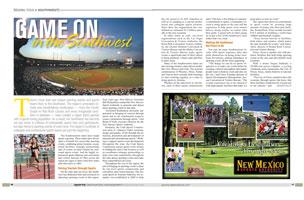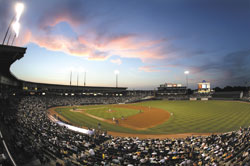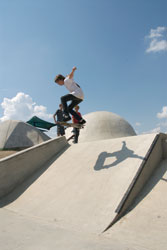
 There's more than one reason sporting events and sport lovers flock to the Southwest. The region's amenable climate and breathtaking landscapes - from the Pacific Ocean to Red Rock Canyon and every imaginable land form in between - have created a region that's packed with a sports-loving population. As a result, the Southwest has become not just home to millions of enthusiastic sports fans and participants, but also home to sporting events of every kind. The region's hundreds of collegiate and professional sports teams are just the beginning.
There's more than one reason sporting events and sport lovers flock to the Southwest. The region's amenable climate and breathtaking landscapes - from the Pacific Ocean to Red Rock Canyon and every imaginable land form in between - have created a region that's packed with a sports-loving population. As a result, the Southwest has become not just home to millions of enthusiastic sports fans and participants, but also home to sporting events of every kind. The region's hundreds of collegiate and professional sports teams are just the beginning.
The Southwestern states have made sports a priority. These states have developed a formula for successful sporting events, combining prime location, exceptional facilities, strategic partnerships and, of course,an ideal climate for year-round sports events. And the highly experienced sports alliances and convention and visitors bureaus across the region are eager to share what their states and cities have to offer.
Driving Tourism through Sport
On the state and city level, the Southwest has dedicated time and resources to attracting sporting events to the region. Four years ago, New Mexico governor Bill Richardson created the New Mexico Sports Authority to generate and attract more sporting events to the state.
"Governor Richardson obviously saw potential in bringing in tourism through sports and we are continuously trying to create a destination through sports," said Brian O'Neill, executive director for the New Mexico Sports Authority.
 Similarly, the Utah Sports Commission aims to "enhance Utah's economy, image and quality of life through the attraction, promotion and development of national and international sports." Working to support sports event development throughout the state, the Utah Sports Commission assists sports event owners in finding the ideal Utah location as well as coordinates strategic partnerships to help cities and communities throughout the state attract sporting events and make them unparalleled successes.
Similarly, the Utah Sports Commission aims to "enhance Utah's economy, image and quality of life through the attraction, promotion and development of national and international sports." Working to support sports event development throughout the state, the Utah Sports Commission assists sports event owners in finding the ideal Utah location as well as coordinates strategic partnerships to help cities and communities throughout the state attract sporting events and make them unparalleled successes.
Throughout the rest of the region, the job of bringing in sporting events is done by city-level sports commissions and convention and visitors bureaus. The Arizona Sports & Tourism Authority, for example, was established in 2000 to help the city preserve its NFL franchise as well as its standing as a top-tier professional and collegiate sports location. Since then, the organization has contributed an estimated $1.5 billion annually to the area economy.
In other states as well, city-level organization such as the Las Vegas Convention & Visitors Authority, the Reno-Park Convention Visitors Authority, the Greater Houston Convention & Visitors Bureau and the Dallas Convention & Visitors Bureau make sports events a significant part of their efforts to bring attention, visitors and cash flow to their areas.
 Many of the Southwestern states are also moving toward a state-driven model, like New Mexico and Utah. The Arizona commissions of Phoenix, Mesa, Tempe and Tuscon have recently held meetings to start working together as a state to bring sports to Arizona.
Many of the Southwestern states are also moving toward a state-driven model, like New Mexico and Utah. The Arizona commissions of Phoenix, Mesa, Tempe and Tuscon have recently held meetings to start working together as a state to bring sports to Arizona.
Whether on the state-level or city-by-city, each of these sports commissions and CVBs have a few things in common: a commitment to sports, a community excited to bring sports to the area and the experience to help sports event owners deliver strong results, no matter what their goals. A quick look at what's going on in just a few of the Southwest's cities makes that very clear.
Making the Southwest the Place to Be
Not only do many Southwestern locales offer sports expertise, they also pride themselves on being prime locations for tourists, making attendance at sporting events all the more appealing.
"The things we can do as sport organizers is to make our events better by creating a festival atmosphere that makes people want to hold an event and also see the city," said Vince Trinidad, director of Sports Development Metropolitan, Tucson Convention & Visitors Bureau. "The overall experience has to be attractive with high-quality facilities that make it a great place to host an event."
The region also shows its commitment to sports events by investing large amounts of money into first-class facilities. Round Rock, Texas recently invested $18.5 million in building a world-class softball and baseball complex.
 "Texas invests heavily in facilities, both indoor and outdoor, which makes the state desirable for events," said Nancy Yawn, director of Round Rock Convention and Visitors Bureau.
"Texas invests heavily in facilities, both indoor and outdoor, which makes the state desirable for events," said Nancy Yawn, director of Round Rock Convention and Visitors Bureau.
Frisco, Texas is another city with premiere facilities that help bring sporting events to the area and also benefit local residents.
With a minor league ballpark, a twenty-thousand-seat soccer complex, a cycling valodrome and a natatorium, the City of Frisco, Texas, clearly believes in top-rate facilities.
"The City of Frisco wanted to drive the economy through sports,but knew that these facilities would also be of great use to our citizens," said Marla Roe, executive director of Frisco Convention & Visitors Bureau.
Frisco recently broke ground on the expansion of an existing arena, which will seat up to six thousand and will host events including gymnastics, tennis and boxing.
Leveraging professional- level sports has also been a strategy for cities in the region. With professional basketball, baseball, hockey and football teams, Phoenix leverages its stadiums for all kinds of sporting events, including the NCAA basketball tournament and Major League Baseball's All-Star Game.
"Our venues in Phoenix are second to none, given the professional sports arenas we use for events," said Jon Schmieder, president, Phoenix Regional Sports Commission.
 Southwestern cities are also leveraging collegiate sports teams and their facilities. "The Albuquerque Convention and Visitors Bureau and the Las Cruces Convention and Visitors Bureau have done an excellent job in fostering relationships with their respective universities and the NCAA, which results in New Mexico hosting NCAA events nearly every year," said Noah Trujillo, deputy director, New Mexico Sports Authority.
Southwestern cities are also leveraging collegiate sports teams and their facilities. "The Albuquerque Convention and Visitors Bureau and the Las Cruces Convention and Visitors Bureau have done an excellent job in fostering relationships with their respective universities and the NCAA, which results in New Mexico hosting NCAA events nearly every year," said Noah Trujillo, deputy director, New Mexico Sports Authority.
When USA Rugby was looking for a host city for their National Guard College Club Playoffs, they found New Mexico's collegiate rugby success very compelling. "In working with the local CVB, we also hoped to secure increased exposure surrounding the event, especially given the success of the University of New Mexico's rugby clubs, the Rio Grande Rugby Union and all of its youth subsidiaries," said Dan Payne, director of competitions for USA Rugby.
Great Relationships and Sunny Skies
One factor event owners often consider when selecting a destination is the commitment on the part of the CVBs and sports commissions. Strong, mutually beneficial relationships are key to producing highly successful sporting events, a benefit America's Southwestern states are well-known for delivering.
"When selecting a location, it is important to determine the amount of support the city plans to give," said Dennis Freels, president, FlagFootballx.com. "The Frisco CVB is very active in sporting events in their area, which was helpful to us in planning and executing a successful event."
"For the past 10 years, we've held our Buffalo Springs Lake Ironman Triathlon in Lubbock, Texas. and the support is unsurpassed from the city's CVB, Visit Lubbock," said Mike Greer, executive director for the Buffalo Springs Lake Ironman Triathlon. "The city bends over backwards from financial support to sitting on the side of the road monitoring bikers. Without Visit Lubbock the triathlon would not be what it is today."
Of course, the weather is a huge draw for event owners looking for a sports destination. With more than 350 days of sunshine a year, Tucson is able to field a lot more outdoor sports year-round. Same goes for Austin, with 300 days of sunshine annually.
Even in the heat of the Southwest summer, outdoor sporting events are still popular. When U.S. Soccer held its national tournament in 2007 in Frisco, game times were staggered throughout the day to avoid playing in the strongest heat. The Southwest's weather allows event owners to extend its event season, ensuring a greater possibility of participation. Dependable weather also makes for easier planning, with a greatly reduced need for alternate rain plans.
"We chose Phoenix for the Senior Softball World Championships for many reasons, but weather definitely was a factor since the tournament is held every year in October," said Terry Hennessey, CEO, Senior Softball USA.
